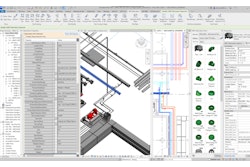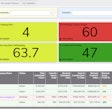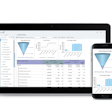
The schedule is a central source of information in construction, and multiple construction software vendors are creating artificial intelligence (AI) for contractors aimed at unlocking insights from or optimizing the schedule.
ALICE Technologies, for instance, creates an optimal schedule based on a set of constraints associated with the product.
“We have built a constraint modeling language or software and what you can do is model any type of constraint that you want,” ALICE CEO René Morkos said in our IRONPROS Product Deep Dive. “We have been doing this for several years, so it is rare to encounter constraints we can’t put in the system.”
SmartPM analyzes the schedule for predictive analytics, including, according to SmartPM CEO Michael Pink, schedule quality.
“A lot of people think schedule quality is about whether the durations correct no most of the time. And no, the durations are not correct because they could either be shorter or longer or somewhere in the middle,” Pink said in a recent IRONPROS video interview. “That's a fluctuating thing whereas these scheduling programs allow a static duration. But schedule quality to me is following best practices to build a schedule that's functional—something that's going to work. Something that's incorporated any and all sorts of logic and relationships amongst all the activities such that what you get out of this program that critical and near-critical paths is accurate and trustable.”
Slate Decision Assistant
October 25, Slate Technologies announced the latest release of Slate Decision Assistant, a generative AI construction decision support tool. Slate Decision Assistant leverages both generative and predictive AI, harnessing what the company says is the first “proprietary Large Language Model (LLM) specific to the construction industry.”
A release said customers were already using the software to streamline workflows, create process innovation and reimagine projects, creating return on investment (ROI) through increased productivity, hours saved, takeoff and estimating speed and project health management.
Announced features include:
- Cross-platform intelligence to connect with and analyzes data from a wide range of software platforms
- Contextual data analytics to create insights into how data points impact project schedules and budgets
- Slate's Proprietary Large Language Model (LLM) with its construction-specific vocabulary to enable intelligent interactions
- Data Visualizations for data-driven decisions
- AI recommendation models that learn from user interactions and project outcomes that in turn drive contextual recommendations that improve over time thanks to machine learning
In an October call with IRONPROS, Slate Technologies CEO Trevor Schick laid out the value proposition for Slate Decision Assistant.
“One customer in particular is using it today that on a daily basis,” Schick said. “We've brought in their data, we've connected their checklists, their RFIs, to their schedules. And then we have a part of Slate that's called visualize that takes the BIM 360 model and pulls it in. But then you pull up the floor of that building, and it will show whatever you’ve spotted in that building and if you currently have something that might impact schedule or cost.”
This insight is then used within the contractor organization for decision support, but also collaboratively with subcontractors.
“They use that tool when they sit down with the trades,” Schick said. “They'll look at it and say, 'Okay, we have an open RFI, that could be an impending five day slip. What are we doing about it? How do we resolve that?' … What we can do is give you a way to get the most important things in that data in front of you—and then if you want to dig into it through conversational AI.”
Another early application for Slate Decision Assistant is subcontractor selection or bid invitation based on historical experience, an area where humans are surprisingly subject to biases according to Schick.
“So think about when you're doing your pre con meeting,” Schick said. “You bring in your initial schedule, and someone says that electrical subcontractor was 40 days late last time, and you only have 20 days of buffer in your schedule. You need to find a different subcontractor. And if we're connected to your vendor list, we can recommend that you should increase your buffer based on what that subcontractor has done in the past. We’re trying to give the right information back to people, both based on learnings of the past plus this being able to use kind of industry best practices and the early days to give them feedback so that they can be more successful in their project.”
But sometimes Schick said the AI has proven less subject to recency bias, for instance, because it can also consider the subcontractor’s total historical record rather than just the last anecdote.
Watch our interview with Slate CPO Joel Hutchines as we discuss technology for industrialized/offsite construction.
Construction Data Standardization
Slate is in good company with other construction AI products pointed at the schedule. But Slate Decision Assistant is also not alone in aiming to access data in multiple applications and then clean, scrub and standardize it into a unified data format.
“When it comes to software used by our customers we're connected to, it includes Primavera 6, Oracle, Autodesk BIM 360, Procore, SAP and Microsoft,” Schick said. “And each one of those have multiple modules. They have checklists modules and RFI modules. We have a data connection wizard so somebody can come in and say, ‘these are the systems I want to connect to.’ The good news is, we also use (integration platform as a service software vendor) Agave, which is a middleware platform that can hook to a lot of others.”
This degree of connection to the enterprise means Slate Decision Assistant can proactively guide the attention of a project team towards the most critical scheduling elements.
“We're going to warn you ahead of time to say, hey, this is the top five lists for you today,” Schick said. “Go get that RFI closed, otherwise, your schedule is going to start slipping tomorrow.”
Schick said Slate was also working on functionality for digital progress reporting, taking it into territory addressed by photogrammetry vendor OpenSpace.
“We have a single family home customer that that will be probably our lead on this one, where they can go to the home and say yes, all the tiling got done and all the drywall is done. It automatically then updates a checklist and is able to start giving insights on whether the homes are behind or ahead, as well as looking for repeat problems, right.”
Schick said Slate Decision Assistant is currently being used as guide-on-the-side AI to advise a construction team, but is already capable of proactively adjusting the schedule to keep projects on track without human intervention.
Slate Pricing and Market
Slate Decision Assistant is currently sold on a three-year subscription that according to Schick will be valued in the hundreds of thousands. The engagement normally starts with a paid pilot that includes implementation and a level of due diligence to arrive at cost for an ongoing contract.
Slate’s current customers all have more than a $1 billion in revenue according to Schick, and the strongest appeal for Slate Decision Assistant may right now be major traditional and modular builders. Slate Technologies had in 2022 purchased offsite construction software company Splash Modular, and early customers are in volumetric and repeatable design construction.
“Our ideal customer is a larger general contractor with projects really across multiple segments,” Schick said. “I mean, most of the ones we're working on right now are $ 50 million and above from a project perspective … really, we're looking for customers that understand the importance of the data. Our customers are the larger ones that have data teams that need to have easier access to that data so they can get more productivity.”
BOTTOM LINE: Slate Decision Assistant presents an interesting value proposition for large generals who want an added layer of predictive schedule intelligence. The customer base is currently small, and contractors will want to evaluate closely Slate’s functional capabilities compared to competing products with a more robust market footprint.















